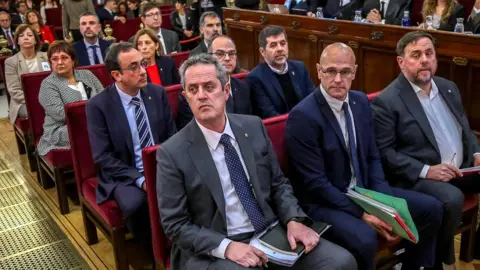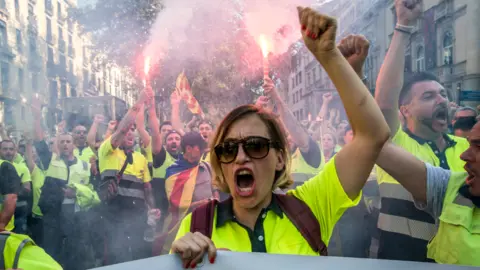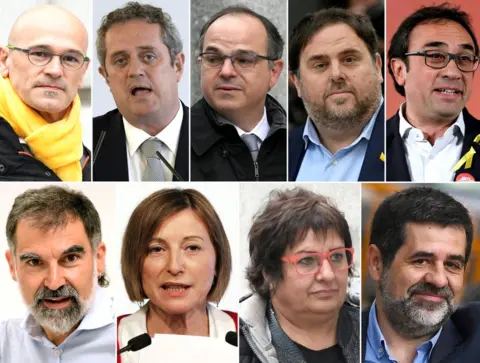Catalan separatists defiant on final trial day in Madrid
 Getty Images
Getty ImagesTwelve separatist leaders on trial over their role in Catalonia's failed 2017 independence bid have given defiant final statements in Madrid.
On the last day of proceedings after four months of hearings, the defendants said they were victims of an injustice in a trial built on "false" charges.
Some of the leaders of the Spanish region are accused of rebellion and sedition and could face up to 25 years in prison if found guilty.
A verdict is not expected for months.
After an October 2017 Catalan referendum, declared illegal by Spain's courts, Catalonia's separatist leaders declared independence.
The highest-ranking pro-independence leader on trial, former Catalan vice-president Oriol Junqueras, is accused of rebellion along with eight others. He could be given up to 25 years in jail but was elected to the European Parliament last month.
Under Spanish law, the charge of rebellion involves a public violent uprising - something the 12 defendants deny ever happened.
The defendants argue their declaration of independence was aimed at implementing the democratic will of Catalans following an unauthorised referendum.
 Getty Images
Getty ImagesThe Catalan crisis is seen as the most serious for Spain since the death of dictator Francisco Franco in 1975 and the country's transition to democracy.
What happened in court?
The defendants were each given 15 minutes to present their final arguments to prosecutors.
Mr Junqueras told the court while he may have made mistakes, his actions had demonstrated his commitment to democracy and social harmony.
"Voting and defending the republic from a parliament cannot be a crime," he said.
Before the session began, a senior justice official recommended that Mr Junqueras be temporarily released from custody on 17 June to be sworn in as an MEP. The solicitor general said the decision was up to electoral authorities.
Activist and former president of the Catalan National Assembly Jordi Sànchez used his time to argue he was the "victim of an injustice", adding: "There are no ideas or principles that should be silenced."
Carme Forcadell, former speaker of the Catalan parliament, said the serious charges against her were "false" and that she hoped to return to politics following the verdict.
Defence lawyers earlier said during closing arguments that their clients all denied the charges of rebellion and sedition, but admitted to the lesser charge of disobedience, which could see them banned from public office but avoid prison.
Who else is on trial?
Another prominent figure in court on Wednesday was Jordi Cuixart, president of Catalan language and culture organisation Omnium Cultural.
 Getty Images
Getty ImagesThe remaining defendants are:
- Joaquim Forn, former interior minister
- Jordi Turull, former Catalan government spokesman
- Raül Romeva, former external relations minister
- Dolors Bassa, former labour minister
- Josep Rull, former territorial minister
- Carles Mundó, former justice minister
- Meritxell Borràs, former governance minister
- Santi Vila, former business minister
Carles Puigdemont, the former Catalan president, escaped trial after fleeing Spain in late October 2017 before he could be arrested, along with four others.
What are the accusations?
Prosecutors argue that the defendants' unilateral declaration of independence was an attack on the Spanish state and have accused some of those involved of a serious act of rebellion.
There is also an accusation of misuse of public funds, in organising a referendum declared illegal by Spain's Constitutional Court.
Prosecutors say the leaders carried out a "perfectly planned strategy... to break the constitutional order and obtain the independence of Catalonia" illegally.
Ms Forcadell, who read out the independence result on 27 October 2017, is accused of allowing parliamentary debates on independence despite warnings from Spain's Constitutional Court.
Some of the accused, speaking to the BBC ahead of the trial, said the proceedings were political in nature. Any violence, they said, was on the part of police and was committed against voters in a crackdown which made headlines around the world.
Nine of the defendants have spent months in pre-trial detention. The remaining three were released on bail.
What is behind the Catalonia controversy?
Three weeks after the banned vote on 1 October 2017, the Catalan parliament declared an independent republic.
Madrid stepped in to impose its rule on the region, and several Catalan leaders fled or were arrested.
Catalan nationalists have long complained that their region, which has a distinct history dating back almost 1,000 years, sends too much money to poorer parts of Spain, as taxes are controlled by Madrid.
The wealthy region is home to about 7.5 million people, with their own language, parliament, flag and anthem.
